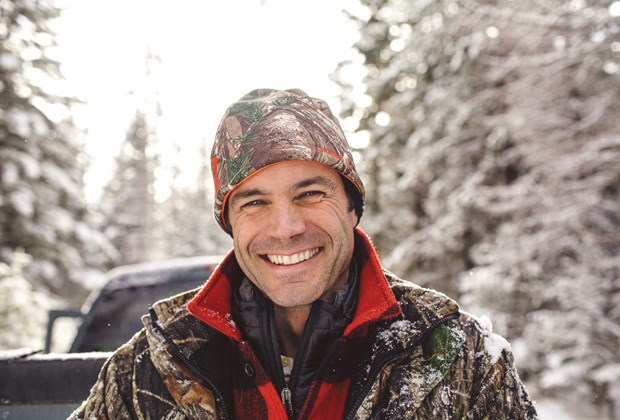At age 16, Chad Brealey recalls rappelling down into the Capilano Canyon, a truly memorable multi-sensory experience.
Years later, during filming for his new television series, Salt, Fresh & Field, Brealey has been reminded of the emotions felt during those excursions, finding himself able to harness the same sense of wonder, amazement and appreciation for what's going on around him.
The digitally focused show's host and coexecutive producer is continuing to challenge himself with new experiences, finding himself all over Western Canada in an effort to showcase regional food stories.
"As soon as you immerse yourself in new communities, and new people and new adventures, you come alive that much more, and you kind of become a kid again," he says.
Salt, Fresh & Field premiered May 31 and the first three episodes are available for free on TELUS Optik TV On Demand. Episodes chronicle Brealey's search for fresh food, following him as he goes hunting, fishing or gathering. Then, the food is prepared and celebrated.
Brealey calls on a colourful cast of local characters, from biologists to fishermen and high-end chefs, giving viewers an opportunity to see things through their respective eyes as they enjoy the resulting meal together. "The passion that these communities have for their own food stories is. .. sitting there right on the surface, just nobody's asked them yet," he says.
Brealey grew up in North Vancouver and graduated from Handsworth secondary. He's currently based in Calgary, though still spends much of his time in Vancouver. His North Shore childhood strongly impacted his perspective. Brealey grew up wandering the wilderness, fishing and exploring area waterways. He went on to work in conservation, including with the Pacific Salmon Foundation, and co-founded the Haig-Brown Institute.
Around 2010, Brealey noticed a shift, seeing people suddenly express an interest in joining him on his hunting and fishing trips, and in discovering what he did in the kitchen thereafter.
"There seemed to be a groundswell of interest in just the general subject matter and I started looking into the media front of it, that's a bit of my background (my background is more print publishing than anything), and suddenly realized there really wasn't anything out there that was tackling this potentially large and dedicated and interested market," he says.
Salt, Fresh & Field was produced by Brealey and his business partner Mary Kellough through their company, Salt, Fresh & Field Media, in partnership with TELUS Optik Local through its Community Access Grant Program.
The show takes a different approach than many of the typical food shows out there, which are often recipe-focused or competition-based.
"We just wanted to get into the beauty and the culture and the small communities and the amazing stories that immediately happen when you start looking for your food," says Brealey.
The show is given a cinematic treatment, similar in quality and look to a feature film.
"It's showing people these beautiful stunning things that are literally in their backyard," says Brealey.
The show's rich soundtrack showcases emerging artists, native to the episode's shooting location.
The first episode offers a cross-cultural take on the sea urchin, comparing how uni is viewed in Victoria in contrast to Japan, where it's a revered, expensive and sought-after specialty food.
The second episode sees Brealey go ice fishing on northern Alberta's Slave Lake, joined by area chef Tony Giesbrecht, from Top Chef Canada.
And the third follows the journey of chef Jeff Van Geest of Oliver's Miradoro restaurant. An avid farm to table restaurateur, Van Geest goes hunting for the first time in search of his first whitetail deer.
"There was a lot of emotion attached to it for him because it was really his experience," says Brealey. "Of course he's cooked for thousands and thousands of people but he's never provided them with his food before in that way. And that's the case really across the board that we're finding, is people have these very personal attachments to their food and they don't necessarily even know it until we present them with that opportunity."
Brealey hopes to shoot more episodes as a means of continuing to offer viewers a shift of perspective.
"We're not expecting people to suddenly go out and become anglers and hunters and so on, but there are places that are available that people can appreciate, and appreciating those that do that is kind of the next step and it's kind of one big step past the farmers market."



